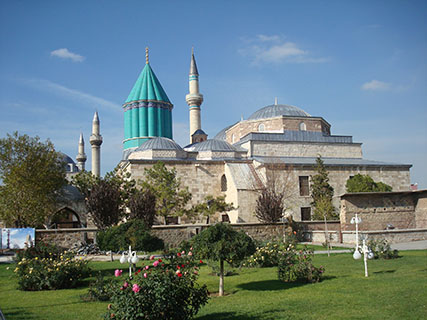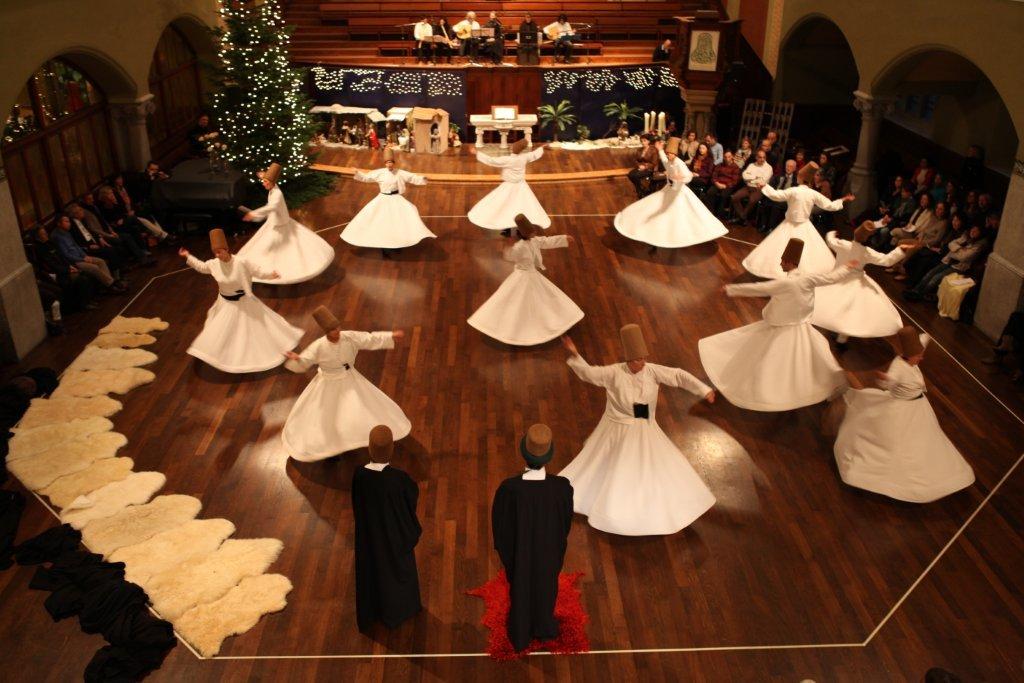(Workshop on communication, Medipol University Ankara, 25th of November 2023)
Short speech by Peter Hüseyin Cunz, Mevlevi-Order in Switzerland
Bismillahi ar-Rahmani ar-Rahim
The Pir of the Mevlevi Order, Mevlana Celaleddin Rumi, has conquered the West with his poems like no other poet. This is a new phenomenon of the 20th century. In earlier times Mevlana was no better known than al-Ghazali, Ibn ‘Arabi, and other Islamic scholars. How was this accelerated awareness possible in today’s time?
I was asked to talk about communication. Any communication includes a source and a receiver. Both contribute to the success of the transmission of a message. Would you listen to me now if you were not interested in what I had to say? Certainly not! As a speaker, I depend on your interest. Therefore, anyone who communicates must have the recipient in focus. If we want to understand the communication of Mevlana, we have first to know his personality, and then we should ask: “To whom was Mevlana’s message addressed? Who was interested and pleased by it? And who felt challenged by it?”
About Mevlana’s personality I just want to emphasize that he had great reverence for our Prophet. His thoughts and actions were guided by the Qur’an, the Hadith and the Islamic customs (Sunnah), as it was the standard for a person like him. He served as a jurist to the Seljuq rulers in Konya; Islamic jurisprudence (fıkh) was his bread and butter. From an academic point of view, he had reached the pinnacle of Islamic scholarship.
Through his meeting and friendship with the mystic Shams of Tabriz, and mainly through the loss of him later-on, his point of view shifted. He started to see the world in a new light. He began to dictate poetry and cultivated his love for music and Sema. Without having sought it, he became a great master of mysticism. He describes the achieved state in his typical way:
Those who have polished their hearts have escaped from mere scent and color;
they contemplate beauty at every moment without tarrying.
They have left the form and shell of knowledge;
they have raised the banner of certainty.
Thought has gone, and they have found light;
they have found the essence and the sea of divine knowledge.
(Mesnevi 1:3492 ff)
After loosing his friend Shams of Tabriz, Mevlana behaved more or less the same way as before, and he continued to serve the Seljuk ruler in matters of jurisprudence. But now he addressed people who had already developed a certain openness to the divine world. They were deeply touched by him. Mevlana enlarged their view of this world and fostered their inner access to the divine.
All this happened over 750 years ago. And how is it today? One thing is clear: whoever is a serious pupil of Mevlana today will be a serious follower of the Islamic faith. I’m afraid there are not many of them in the West! Therefore, the popularity of Mevlana in the West has little to do with following his doctrine. Mevlana never asked to become a “free thinker” according to the fashion of today’s Western culture. (By the way, when I talk about the Western culture it includes that part of the population in Türkiye that loves the European and American way of life.)
We have now understood that it is not Mevlana’s doctrine making him popular in the Western culture. But why are non-Muslims and seculars touched by him? In the West we can observe a spiritual isolation of the individual. Many people reject the traditional religions for understandable reasons and look for new spiritual teachings. Thus, a veritable spiritual market has emerged in which thousands of self-proclaimed masters from East and West offer a spiritual program. The individual person is completely overwhelmed by the amount of seductive offers and thus easily falls into their trap.
Many of these offers include the claim to communicate directly with the Divine. For me this is completely pretentious and absolutely unacceptable. I learned from Mevlana that we are not entitled to a direct communication with the King. The King does not speak directly to the common people. He has ministers and officials at his court for that purpose. According to Mevlana, the way to perfection is through the Shaykh and the Prophet.
But still, despite Mevlana’s clear affiliation with traditional Islam, the spiritual market of the West has found him as suitable bait. Single verses picket out from the context lend themselves to a cheap promise, a promise of spiritual experience without effort and without submitting to an existing form. Today’s providers of books on Mevlana succeed in presenting a New Age-view on Mevlana. They do that by leaving away all what has to do with Islam, and by leaving away all statements that talk about the hardship of a spiritual path (tasawwuf). Also they simplify and shorten the verses, and they don’t indicate the source.
It just so happens that people love fantasy bubbles. Our world is full of them – we only need to observe the huge consumption of virtual worlds offered with advanced electronics. In the West, Mevlana is misused as an instrument for freedom and liberation from all religious forms. Adapted excerpts of his poems are used to legitimize a spirituality that seeks well-being. It is the spirituality of our time that mostly serves one’s own Self (nafs).
So we can conclude now that Mevlana’s popularity in the West is not based on an authentic relationship with him, but on a supply of adapted and romanticized verses of his poems. The spirituality of New Age declines his insisting to surrender to the prophetic path, and it is not interested by his repeated reminder to work hard.
Let me end with the general question of how religiosity and sacred statements can be communicated. I remind you again that the recipient of a communication is as important as the source. It is not enough to preach sacred texts if there is no interest in them. Among the Sufis we know the ritualized spiritual teaching (sohbet), in which the Shaykh speaks to the listeners. A necessary condition for this is that the listeners listen attentively. For all Sufis there is an irrevocable commandment that no one interrupts the Shaykh. If this condition is fulfilled and those present listen devotedly, an atmosphere is created where the Shaykh is inspired to say what is necessary for those listening. Thus, a sohbet does not succeed solely because of the Shaykh’s knowledge, but much more thanks to the devotion and openness of the listeners. The French philosopher Blaise Pascal (1623-1662) put what I wish to convey to you in a nutshell:
Worldly things must be known so that they can be loved.
Divine things must be loved so that they can be known.
Applied to Mevlana, this means: one must love all his statements in order to understand him. And this includes a love for Islam and the Prophet. For you this is normal because it is part of the Turkish culture, but for people in the West it is difficult. Their understanding of Islam is shaped by what they read in the newspapers, and thus they fear Islam. Without support they can’t discover its beauty. So they tend to rather follow a romanticized view of Mevlana and not bother about Islam.
In the hope for a spiritual experience many people from the West travel to Türkye. They believe that the Whirling Dervishes know the secret of spiritual experience. But then they are disappointed because they encounter only theatrical folklore. This can’t be in the interest of Turkey. Please be aware: the tourists attending Sema are not stupid, they can very well distinguish between serious spirituality and theatrical spectacle.
In your beautiful country there is an immense richness of spiritual knowledge. But the way Mevlana’s name and the Sema are currently communicated and misused for all sorts of advertisement gives me cause for concern. Türkye should be proud of its spiritual heritage and not allow its degrading to the level of cheap spiritual fantasies! Sema is not only part of the cultural heritage but much more of the spiritual heritage! I think that the authorities of this country have a responsibility to emphasize the religious aspect and the seriousness of the Sema and other Sufi rituals. They should do this in respect for Islam.
Thank you for listening!





